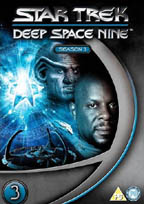
STAR TREK:
DEEP SPACE NINE:
Season Three:
|
Star Trek: Deep Space Nine - Season 3
The Search(Star Trek - Deep Space Nine episode production codes 447 & 448 - 3rd season opener, 2 episodes)story by Ira Steven Behr and Robert Hewitt Wolfe part one teleplay by Ronald D. Moore, part two teleplay by Ira Steven Behr directed by Kim Friedman (part one) & Jonathan Frakes (part two) Along with its partial set-up "The Jem'Hadar" at the end of last season, this turns out to be one of my favourite episodes of Deep Space Nine ever. Unlike the other "big" stories around this time like "The Maquis", the Next Generation's finale "All Good Things...", and the feature film "Generations", this story is a true event in the Star Trek universe, tying up Odo's external search for his home and his people, and launching into a new arena of conflict with three new races to contend with. Part One of "The Search" employs a lot of successful scripting tactics to build towards both confrontation for our regular characters and revelation for Odo personally. Part Two engages some often seen devices on Star Trek, (and I'll refrain from naming them to avoid spoiling them for new viewers), but rarely are these ideas pulled off so well. I think this episode is far more successful at keeping its secrets until the end than most others. And because long-term developments and consequences are being taken into account, the events and information here seem more important and interesting than usual, while doing a better job of speaking to the logic of all the various characters. The relationships between so many characters also develop well here in this story, and everyone seems more true to themselves in the end, particularly Odo and his people as we see what they have in common and what differences exist between them. And there's some amazing imagery here as well. Director Jonathan Frakes is absolutely on form getting stand-out performances and devising excellent shots. If there's anything I would improve, it would be the scene which introduces Eddington and the Romulan Torul. The logic of their characters insists that they both need to come in at the beginning and be full participants in the briefing, rather than just coming in at the end to say hello and then leaving again. It's particularly a shame because we don't really get to know anything about Eddington outside of that scene, and it is a long time before he appears in another story. Incidentally, actor Kenneth Marshall playing Eddington had also played the lead character in the fantasy film "Krull". This is a very different look for him here.
Article written by Martin Izsak. Comments on this article are welcome. You may contact the author from this page:
|
||||||||||||||||||
|
| |||||||||||||||||||

LYRATEK.COM |
|
||||||||||||||||||



 Region 1, NTSC, U.S.
Region 1, NTSC, U.S. Region 1, NTSC, Canada
Region 1, NTSC, Canada Region 2, PAL, U.K.
Region 2, PAL, U.K.
